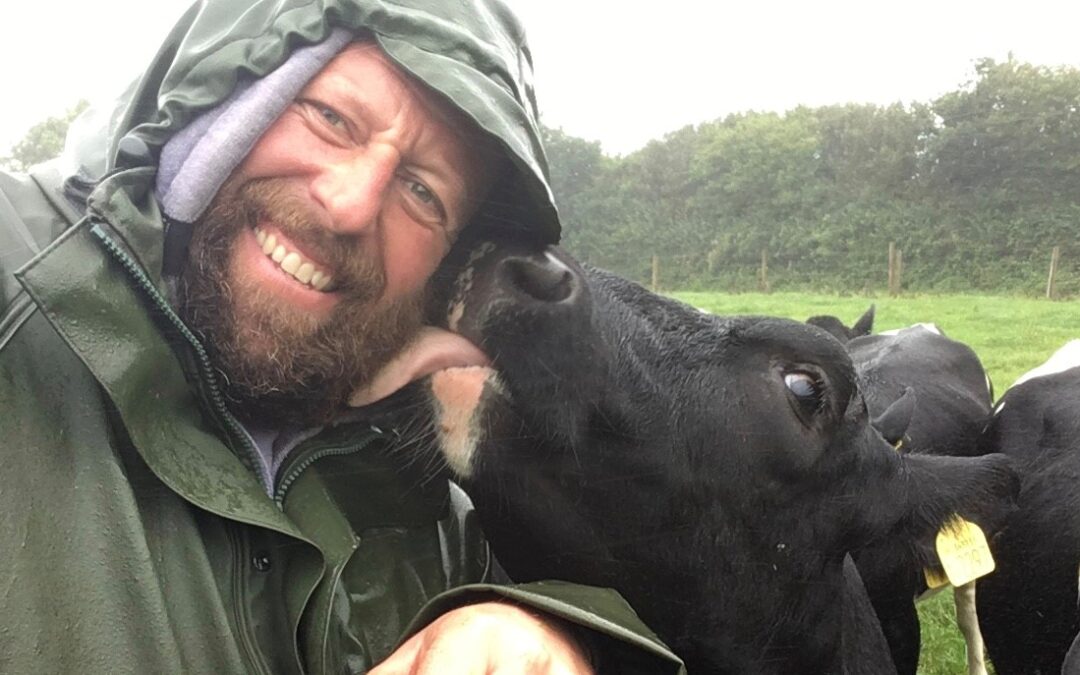In our latest Tamar Water Stewardship Business Board (TWSBB) blog, Tamar catchment-based Arla farmers Will and Tanya Luke share their passion for improving the environment, particularly soil health, and we find our more about Arla’s business sustainability goals.
Operating sustainability is a major focus for our TWSBB member, Arla, with reducing carbon emissions, minimising waste and supporting natural ecosystems of particular importance.
As a farmer-owned dairy cooperative, with around 2,500 farmer owners across the UK, they understand that a symbiotic relationship with nature is absolutely essential to sustainable farming. The cooperative has recently embarked on a large-scale project to explore how regenerative farming techniques can be utilised on dairy farms.
Arla farmers are encouraged to take part in its Climate Check programme. This is a carbon footprint assessment that is independently verified by an external consultant and helps farmers identify the best areas to reduce the carbon footprint of their individual farm.
94% of UK Arla farmers had a Climate Check assessment in 2021. The findings from last year’s results show that Arla farmers already produce milk with about half the global average carbon emissions. Now Arla is helping its farmers go further and have set the target of a 30% reduction per kg of milk by 2030, and to be carbon net zero as a business by 2050.
Arla farmers Bill, Geraldine, Will and Tanya Luke have a herd of 150 dairy cows plus followers at Porsham Farm, Tamerton Foliot in the Tamar Valley. They also raise dairy beef and rose veal, supplying box scheme customers and Plymouth restaurants ‘Eat Salumi’ and ‘The Fig @ 36’. Tanya runs an award-winning celebration cake business, Porsham Cakes, using Arla Pro unsalted butter, made with milk from Arla Farmers. They also host school visits and a local forest school ‘Wild about Woods’ on the farm.
The couple are passionate about improving the environment and in particular the farm’s role in carbon sequestration. They are keen that this is quantified to show the ability of soil and grassland in storing carbon. Improving soil health has been a focus in recent years.
“My role as a farmer is to nurture, provide and sustain the chemical, physical and biological wellbeing of the soil to give my plants every available advantage to reach their full potential,” says Will. “Do they have enough water, food, shelter? Are they receiving a balanced diet? Is their home right for them? Is the soil loose and friable or tight and compacted?
“Carbon and water play a massive role in this,” he continues. Changing weather patterns towards drier summers and wetter winters mean that soil carbon is more important than ever, he believes. “Soil carbon stores moisture for the droughts and holds water to help prevent run-off and flooding in the winter. Much of our efforts over the last decade have been centred on regenerative agriculture and water sustainability.”
For the past three years Will has been using diverse herbal leys for grazing and making silage. This has improved the drought resistance of their farm and reduced reliance on bought-in cattle feed. Focusing on producing as much of the cattle’s diet as possible as well as cutting fertiliser and chemical use is helping to improve the overall sustainability of the business, while also benefitting the environment.
Improving wildlife habitats has been a goal too and the Lukes have reduced hedgerow cutting to create wildlife corridors across the farm and have been rewarded with increased populations of nesting birds. Coppicing hedgerows has also been introduced. Will and Tanya hope that in years to come they will provide shelter for cattle in hot summers and reduce wind erosion.
Efforts to protect the River Tamar is of course also ongoing too, says Tanya. “The aim for this year is more engagement with the Plymouth River Keepers through Westcountry Rivers Trust and the Tamara Landscape Partnership with whom we have recently become a nodal farm.”
Since its beginnings in Denmark and Sweden in the 1880s, Arla has grown across seven countries with a total of 12,000 farmer members.
Will Luke is pictured with one of his herd, Mabel.

